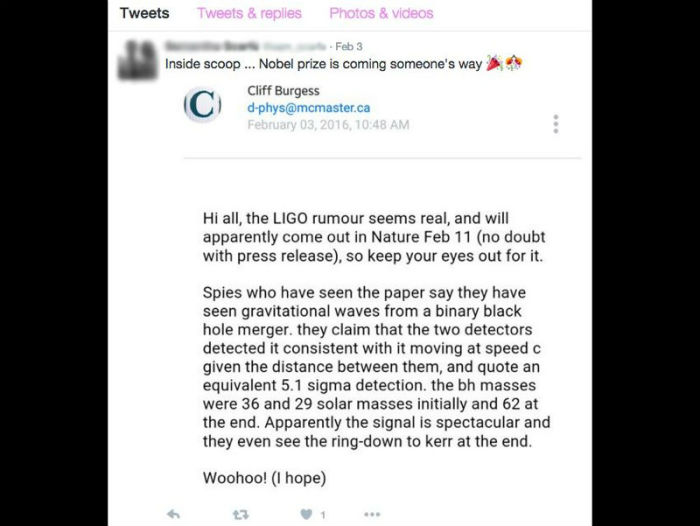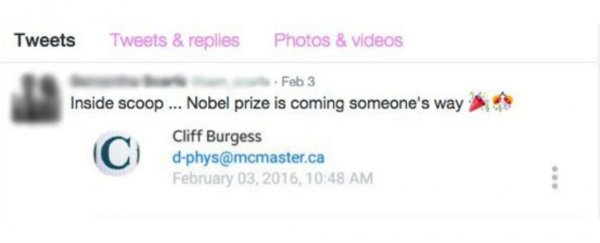Last month, American theoretical physicist Lawrence Krauss tweeted that the results of a recent experiment looking for gravitational waves have finally been peer-reviewed, and we could have our first direct evidence that these light-speed ripples in the Universe actually exist.
While the group behind the rumoured discovery has been telling everyone to be patient and not jump to any conclusions until an official announcement has been made, theoretical physicist Clifford Burgess spilled even more beans over the weekend, sending an email to the entire physics department at McMaster University in Canada that he's seen the evidence, and it's the real deal. Cue woefully premature Nobel Prize scoops and emoji fanfare.
To get you up to speed in case you missed last month's minor debacle, gravitational waves are a crucial part of our understanding of how the Universe functions, but despite being predicted by Einstein way back in 1916, no one's ever made a direct observation of one.
When you see animations of hugely massive objects - such as black holes - interacting with their surroundings, you get those giant, curvy grids superimposed over everything to illustrate how the fabric of the Universe is stretched out of shape by its most colossal residents.
When something particularly explosive occurs, such as a star exploding or a black hole merger, ripples in this curvature of spacetime - or gravitational waves - emanate from the source, like ripples spreading through a pond when you drop a stone in.
"According to Einstein's general theory of relativity, gravitational waves explain how mass in the Universe influences the shape of space. Thanks to gravitational waves, the fabric of spacetime around anything that's particularly massive can become curved, and this curviness can then ripple out elsewhere in space, like how seismic waves propagate in Earth's crust."
Put simply, we're almost positive that gravitational waves exist, but finding them has been near-impossible to this point, because imagine the Universe is the world's largest pond, and someone threw a stone in on one side, and you're trying to detect ripples on the other side. It might take a whole lot of energy to produce gravitational waves, but the spacetime ripples that we use to detect them are incredibly faint.
"Physicists estimate that by the time gravitational waves reach Earth, they're on the order of a billionth the diameter of an atom," Maddie Stone writes for Gizmodo. "You need ridiculously precise instruments operating in completely noise-free environments to measure them, and until very recently, our detectors simply haven't been up to snuff."
But all of that might have changed with LIGO - a ground-based observatory in Louisiana that recently launched the world's first space-based gravitational wave detector, called the LISA Pathfinder - because it's the LIGO team whose secrets keep getting spilled.
Here's Burgess's leaked email, posted by Jennifer Ouellette at Gizmodo:

If none of that means anything to you because you're not a theoretical physicist, Adrian Cho explains over at Science that what Burgess is describing is some pretty solid evidence. "The statistical significance of the signal is supposedly very high, exceeding the 'five-sigma' standard that physicists use to distinguish evidence strong enough to claim discovery," he says.
Burgess told Cho that his email is based on conversations he's had with people who've seen the paper detailing LIGO's observations, and that the evidence within seems more credible than anything that's been announced previously. He said his intention to email everyone in his department about this week's announcement wasn't to cause Twitter hype, but to help inspire physics students who might be struggling with their day-to-day studies.
Once again, we'll have to wait till February 11 to see if all of this excitement - and Nobel Prize buzz - is warranted, but we have a really good feeling about this. In the meantime, watch this explainer by PHD Comics to ensure that your gravitational waves game is strong for Thursday:
